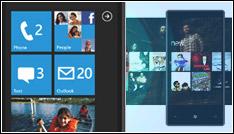Samsung Adopts Microsoft Windows Phone 7

Good news for Microsoft – Samsung has committed itself to Windows Phone 7 devices in 2010
Microsoft has boosted its chances in the smartphone sweepstakes after it signed a licensing agreement with Samsung to bring Windows Phone 7 devices to the UK in 2010.
Just weeks before Microsoft’s new smartphone platform is due to arrive, Samsung signed on the dotted line, committing itself to Windows Phone 7, which some observers feel is Redmond’s last chance to catch some smartphone market share.
“The announcement marks Samsung’s long term commitment to including Windows Phone 7 devices in its smartphone portfolio,” said the two companies. “Samsung plans to launch several Windows Phone 7 devices this year in Europe, the US, and Asia.”
Phone 7 Commitment
“For years, Samsung has been a key partner in bringing new Windows phones to customers all over the world,” said Steve Guggenheimer, Corporate Vice President, OEM Division at Microsoft. “Windows Phone 7 is an important release and we look forward to deepening our collaboration with Samsung on mobile devices and beyond, with our multi-screen strategy.”
 “The addition of Windows Phone 7 devices to Samsung’s smartphone portfolio is a significant milestone,” said Simon Stanford, Head of Mobile, Samsung UK and Ireland.
“The addition of Windows Phone 7 devices to Samsung’s smartphone portfolio is a significant milestone,” said Simon Stanford, Head of Mobile, Samsung UK and Ireland.
“Samsung’s new Windows Phone 7 based smartphones will play a key role in reinforcing Samsung’s leadership in the smartphone market and commitment to providing a range of devices across a variety of platforms,” it said.
The deal is not overly surprising considering the fact that Microsoft has been demonstrating its upcoming phone software for some time on Samsung handsets. Samsung of course has its own mobile operating system, dubbed Bada, and is of course also committed to Android.
Symbian Plight
The deal does however throw into stark relief the plight of Symbian at the moment. Sony Ericsson recently confirmed it has no plans for new Symbian-based products, leaving Nokia only as the only top-tier device manufacturer on the Symbian board.
Indeed, Symbian’s principle backer, Nokia, has previously publicly stated that it is going to drop Symbian^3 OS from its flagship N range handsets, but later seemed to backtrack on this. It will however keep Symbian on its lower end handsets.
That is not to say that Symbian is down and out. It is still the world’s largest mobile operating system, but it is losing market share. Its clunky user interface has been flagged as a possible problem area for the OS.
Symbian Speaks Out
Symbian for its own part has hit back against analyst criticism of its open source stance, most notably from Nick Jones, vice president and distinguished analyst at Gartner.
“I’ve seen an article recently that said all of the experts and companies sitting on the technology councils are wasting their time,” wrote Daniel Rubio, the new Leadership Team member for Technology and Delivery Management at the Symbian Foundation on a blog posting. “Actually, these councils are the open source mechanism that makes our diverse community truly agile, allowing them to align their interests and collaborate to enhance the Symbian platform efficiently and effectively.”
And looking forward Rubio, who has also previously worked on Android, said he was excited about the new user interface in the next version of Symbian.
“Of course, there is much more to come on the UI in S^4, with a completely new user and app development experience,” he wrote. “We’re still accepting contributions to S^4 so I’d really encourage developers to take a look and see what they can bring to the next version of the platform.”